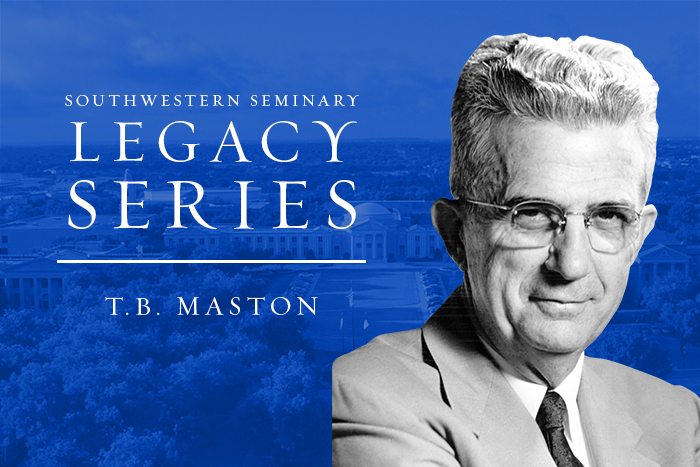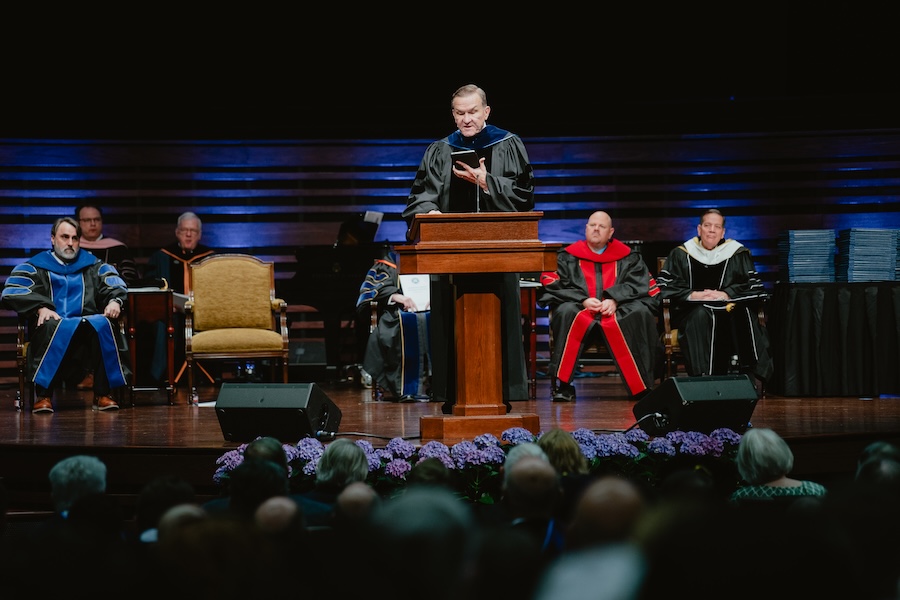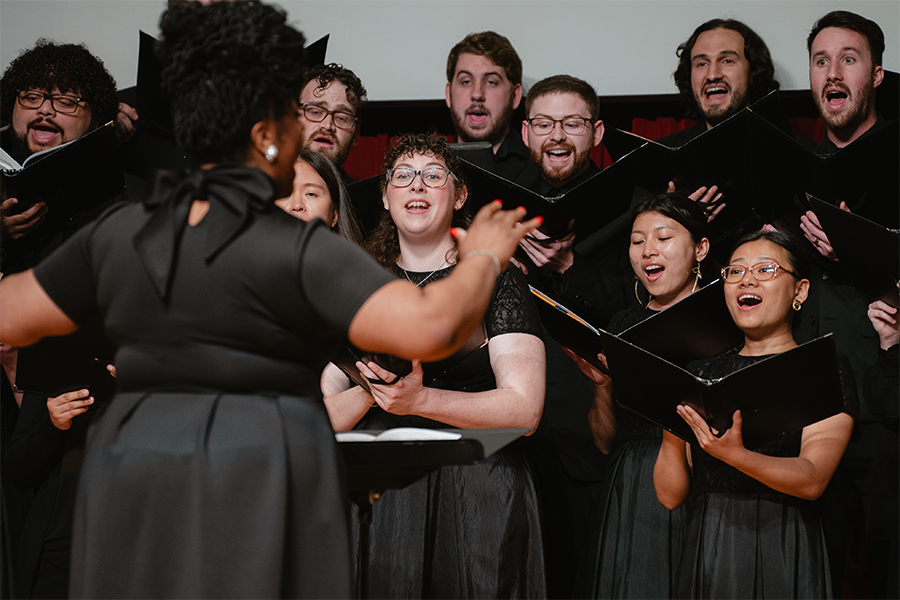SWBTS Legacy: T.B. Maston

During a weeklong revival at a small Tennessee church, 17-year-old T.B. Maston begrudgingly attended the final evening service. After the preacher delivered his sermon and the church began to sing “Just As I Am,” Maston was overwhelmed with emotion and wept in his pew.
A friend placed his arm around Maston to console him. Maston said to him, “I wish I could accept the pastor’s invitation.”
The friend simply replied, “You can if you will.”
Later recalling his moment of salvation, Maston said, “If I interpret it correctly, what happened to me that night was that back behind those pews in the old Smithwood church, I said, ‘I will’; and when one says, ‘I will’ to God, he surrenders his will to the Lord’s will.”
For the remainder of his life, Maston would make that daily decision to surrender to the Lord’s will.
Thomas Buford Maston was a highly regarded teacher and ethicist. He became a pioneer in ethics at Southwestern Baptist Theological Seminary, and was particularly known for the way in which he influenced the Southern Baptist Convention’s thoughts on race.
Maston made a profound cultural impact as an ethicist, but his first love was his calling as a teacher.
Not long after his salvation, Maston sensed a call to ministry. He was confident in this call and willing to surrender to the Lord’s will, but he struggled for many years to discern the specifics of this calling.
Maston never felt at ease with the idea of being a pastor. In fact, he later made it a point to serve the church as a layman rather than as an ordained minister.
In the meantime, Maston started teaching Sunday School classes and served as the occasional fill-in for Sunday sermons. Through such opportunities, he discovered not only an aptitude for teaching, but a calling from the Lord.
He went on to graduate from Carson-Newman College in Tennessee in 1920, where he met his wife, Essie Mae McDonald. Each of them was eager in pursuing God’s calling on their lives, so both enrolled in Southwestern Seminary in the fall of 1920, completing their Master of Religious Education degrees in 1923.
Maston went on to pursue a Doctor of Religious Education, the first student to do so at Southwestern Seminary, as well as additional degrees from Texas Christian University (M.A. Sociology, 1927) and Yale University (Ph.D. in Christian ethics, 1939).
Maston began teaching at Southwestern Seminary in 1922, and in the following years established a robust Christian ethics curriculum. In 1943, he crafted a department of Christian social ethics at the seminary.
As a teacher, Maston prioritized relationships with students and was devoted to daily prayer for them. He was a favorite for many seminary students, both as a teacher and mentor. Maston once said of his calling to teach, “I’d rather teach than eat. I’ve never taught a class that I didn’t enjoy.”
Maston taught during the Civil Rights movement, when people were calling for social justice, even within the church. He emerged as an influential figure at Southwestern Seminary and in the SBC for how he taught others to look at social issues through a biblical lens.
Occasionally, his commitment to Scripture put him at odds with people, particularly regarding race. He led many in the denomination to face their sin of racism and to recognize that the treatment of minority groups had not been based on Christian ethics and biblical principles.
Maston was passionate about whatever he taught and was willing to push back on old ways that did not align with the Bible, yet he always did so with kindness and compassion. He received many supportive letters during those years, but he received equally as many letters condemning his work that advocated for a racially inclusive denomination.
In an address to the SBC in the early 1950s, Maston pled with Southern Baptists to not be on the wrong side of history regarding race and the Supreme Court’s recent decision to abolish segregation in the schools. The speech garnered national attention and was reported by both religious and secular publications.
Maston’s work as an ethicist made him a much sought-after figure in denominational service and in community roles. He helped form the Christian Life Commission (along with J. Howard Williams and others), served on SBC advisory councils, and served in community organizations including the National Association for the Advancement of Colored People and the Local Urban League.
Maston taught on race in five of the Southern Baptist seminaries and, by 1938, began to offer a new course, “Social Problems of the South.” Then, in 1944, he offered a course entirely devoted to race, “The Church and The Race Problem.”
In this latter course, Maston asked black leaders to address the class and frequently took students to Fort Worth black communities. “I always thought that the trips would be the things they would remember the most about the course,” Maston said. He also required student field study and reports on a selected social problem in Fort Worth, such as provision for blacks in the public school system.
After one meeting with black leaders in North Texas during which Maston spoke about love, one man asked him, “Isn’t there a real danger that one may make love a substitute for justice, a mere sentimentality?”
Maston answered, “Not genuine Christian love. It is inclusive of justice.”
In 1951, Southwestern Seminary opened regular classes to black students, something Maston had urged the seminary to do for many years. One of these students, Clarence Lucas, said of Maston: “At a time when I wasn’t even allowed to live in dormitories, Maston would come and talk with me. He offered some direction, and then let me as a proud human being struggle with it myself. I personally prefer this to any paternalism.”
Although progress was made in the broader culture and in the SBC, Maston recognized that such accomplishments did not call for self-congratulation, but rather pointed to the need to keep pressing on in the difficult but necessary work.
Racism and its effects were not settled; rather, “There are plenty of things that still need to be done,” Maston said.
Maston retired from his teaching position at Southwestern Seminary in May 1963, but he continued to follow the Lord’s will for his life. He retained his seminary office, where he continued to meet with students, study, and devote time to writing. In fact, Maston published more works in retirement than in the entirety of his career.
Of his many articles and books, some of his noteworthy publications include Segregation and Desegregation and The Bible and Race, both of which are considered widely significant contributions on race.
Maston’s influence was far-reaching, but possibly the most significant way in which he impacted the denomination was through the generations of students he taught who also surrendered to the Lord’s will, faithfully served in churches and on the mission field, and led Southern Baptists to honor the Lord in their own callings.



